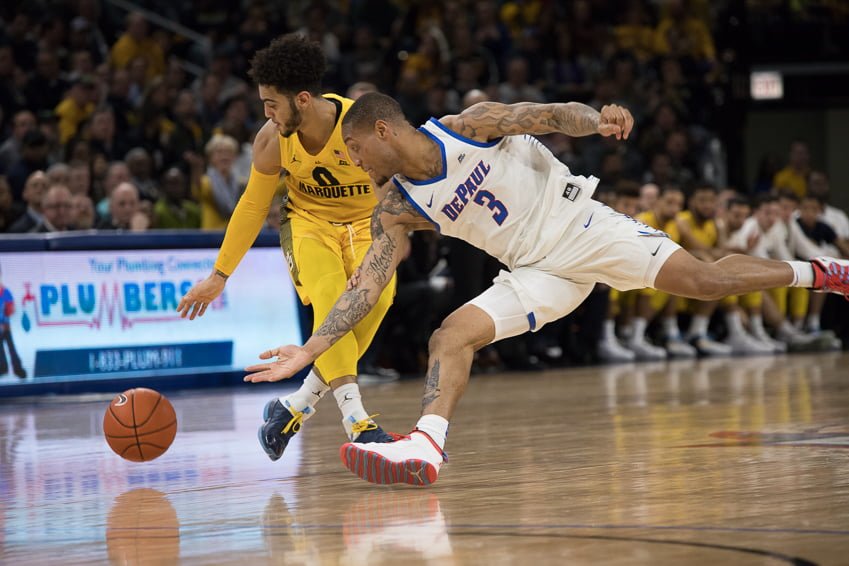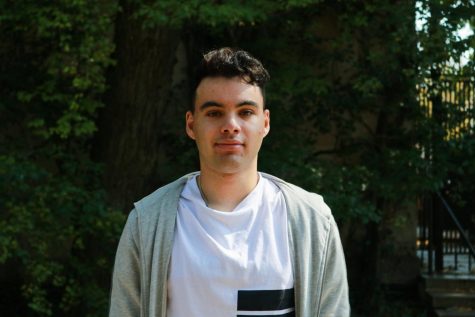College basketball has become known for its intense rivalries over the years, with most conferences having a marquee rivalries that is must-see tv. Not only do a lot of conferences around the country have big rivalries, but cities do as well. The biggest college basketball rivalry, for example, is between Duke and North Carolina.
In Chicago, however, there seems to be a lack of that one rivalry that other cities have that has grown over the years into a huge spectacle. With a lack of schools that are known for its basketball prowess in Chicago, it becomes even harder to develop well-known matchups.
The city came alive when in recent seasons, however, Northwestern made their first ever NCAA Tournament appearance in 2017. Then in 2018 Loyola took the city and the country for that matter, by storm when the team shocked everyone by making it to the Final Four in the NCAA Tournament.
Maybe with the fact that college basketball in Chicago is starting to rise from the ashes with the success that Northwestern, Loyola and to a certain degree DePaul have had the last three seasons, fans might see some rivalries being built between those three teams.
While DePaul and Northwestern have chosen not to play Loyola, the Blue Demons and Wildcats might be building something special these next couple of seasons.
On April 16, both schools announced an extension to their home-and-home agreement for another five seasons up until the 2024-2025 season after the first agreement runs out in 2019.
“Both universities, administrations and basketball programs see that there is a tremendous amount of goodness and benefit that comes out of it,” DePaul head coach Dave Leitao said. “Not just in games we’ve played the last couple of years, but for longevity. Both institutions are like-minded in what they want for their student-athletes, so if you look at it from that vantage point and add the local rivalry that there is a lot of interest, then it makes a lot of sense.”
A rivalry can’t be built overnight, it takes years of both programs not only being good and relevant, but also having close and exciting games that get the fans’ attention. While in the last couple of meetings Northwestern has gotten the better of DePaul, in 2017 and 2018 both games were either close or had a massive run that turned the game around.
“I think coach [Chris] Collins has done such a great job of uplifting that program in the time he’s been there,” Leitao said. “In 2017, they went to the NCAA Tournament for the first time in school history, which means they are a formidable opponent. We’ve been in a rebuilding process ourselves, so we’ve gotten to the point where we can be competitive with a lot of teams around the country as well. So, when you have two teams on a bit of an uptick, it can make for the games that we seen and it’s exciting. So, I think nothing will change, they are continuing to recruit and be very good, as we are trying to do here.”
Earlier this past season DePaul and Northwestern met at Welsh-Ryan Arena on Dec. 8, 2018 for their fourth consecutive meeting. In what was supposed to be a game for DePaul to snap out of a three-game losing streak to Northwestern, the Blue Demons succumbed to a 25-0 run in the second half and lost their fourth straight game to the Wildcats.
“The culture, there’s only so much we can do,” DePaul senior forward Femi Olujobi said after the game. “We have to translate it onto the floor and we have to do a better job of that.”
The culture that Olujobi is talking about is something the Blue Demons are still trying to change: one from losing to being recognized as a winning program. DePaul ended the 2018-2019 season with their first winning record in a season since the 2006-2007 season, but still ended up finishing in last place in the Big East.
Having a winning culture also helps build a rivalry because the games will garner more national attention if both programs are playing well.
Longtime DePaul fan and season ticket holder Logan Simios believes winning more games and having more home-grown kids on both rosters, but especially at DePaul, would help draw more fans to games.
“I think only when both [DePaul and Northwestern] get better is it going to help,” Simios said. “But I also believe when they each start getting more Chicago kids in the mix on their rosters. That’s when the best rivalries between these schools took place: when there was someone on the team that they knew each other and played against each other. I think when you add a few more kids from the Chicagoland area to both rosters, and DePaul needs it more than Northwestern because DePaul is more Chicago-based, would help build the rivalry and get more fans’ attention.”
Simios believes that both programs, but especially DePaul, need to start winning more games in order to build the matchup, but he also thinks that the Blue Demons shouldn’t only be playing Northwestern. Simios wants to see DePaul also playing Loyola and Illinois every season because it will help build and grow college basketball in Chicago.
“DePaul and Illinois should be playing every year, just like Marquette and Wisconsin play each other and other types of schools, like Iowa have their own inter-state thing,” Simios said.
“DePaul didn’t play Illinois since 1957 until they played a year ago, when they played down in Champaign and it took that long to get that game. So, in addition to Northwestern having a contract with DePaul, I think Illinois should get a contract with DePaul every year, too.”
While Simios has some optimism that DePaul might get a little bit better next season, he’s still not sure by how much because of losing seniors Eli Cain, Max Strus and Olujobi. He also mentions that with the Big East being better next season, he doesn’t know by how much the Blue Demons will move up in the standings, if at all.
“I’m not sure DePaul is going to be much better next year because we lost some key components in Femi, Strus and Cain, which are all solid players,” Simios said. “So, I would say am I optimistic? The Big East is going to be better next year than it was this year, so I’m not necessarily as optimistic thinking we are going to move up the standings in the Big East that much.”




Joseph Bourelly / Apr 22, 2019 at 8:07 pm
Between all the transfers and recruiting class, plus Paul Reed continuing to develop, DePaul should have a much better team next year. It may take a little time for all the newcomers to gel but there is no doubt they will be deeper and more talented.